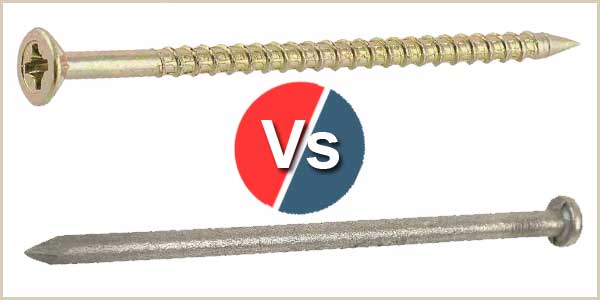When fixing items in carpentry, nails and screws are the most common fixings. Both have their advantages, and in many cases, a carpenter will prefer to use screws rather than nails. However, the opposite is equally true.
A carpenter wont usually have a favourite. Both screws and nails have their uses, and the fixing of choice will depend on the job. Also in some cases, the personal preference of the carpenter.
There are certain jobs where only one type of fixing is suitable, and there are other jobs where either could be used and still do a good job.

For example, you would never fit hinges to a door with nails. This would be a terrible idea for several reasons. It could split the wood, the nails would be prone to movement, and they would be extremely difficult to remove.
Likewise, you wouldn’t install architrave with screws. This would look terrible, and it would be very hard to achieve an aesthetically pleasing finish.
On the other hand if you are constructing something like a stud wall, it would be possible to screw or nail. Both would do a good job and provide a strong fixing. The fixing of choice in this instance will depend on several factors. These include:
- Personal preference
- The tools you have. For example a nail gun would be the easiest option
- If you don’t have a nail gun, screwing may be easier than manually nailing
- Manually nailing will be cheaper than screwing
- Also, access may influence your decision
As you can see, there is no right or wrong answer. Any of these options would work perfectly well.
So, as a general rule a carpenter doesn’t prefer screws or nails. Instead they will choose the fixing based on the job they are doing.
Advantages of screws vs nails in carpentry
Both screws and nails have their own separate advantages. In this section we will look at the main advantages of using screws:
- Screws provide a stronger fixing – Due to screws being threaded, they bite into the wood and create a much stronger hold. A good example of this, can be seen in nailed floorboards. It is very common for nails to move, causing floorboards to squeak. This wouldn’t happen if they were screwed.
- Easier to remove – Screws are much easier to remove than nails. All you need is a screwdriver and you can wind the screw out. Nails on the other hand are far more difficult to remove, as they form a permanent fixing.
- More precise and easier to adjust – Fixing with screws allows you to be far more precise. The screws can be wound in and out to adjust tightness. It can be particularly useful when you are packing something out. This is often done to achieve a flat, level, or plumb surface.
- More aesthetically pleasing – In jobs where the fixings remain exposed, it is much more common to use screws to provide a nice finish. For example, visible screws in something like a door handle.
- Less likely to split wood – Whilst a screw can still split wood, it is easier to mitigate with a pilot hole. Therefore, it is less likely to split wood than a nail.
Advantages of nails vs screws in carpentry
Whilst screws have lots of advantages, nails also have several benefits that can cause them to become the fixing of choice.
- Fast installation – Nailing can often be quicker than screwing. This is especially true if you have a nail gun. However, even manual nailing is often faster when performed by a skilled carpenter.
- Cheaper – Nails are usually far cheaper than screws. For this reason, on jobs where either fixing will do, a nail may be the preferred choice. The caveat to this, would be nails for a nail gun. However, the speed will often make up for extra expense. After all, time is money.
- Nails can be punched and filled – Whilst screws look better when they are on display, they are not as easy to cover up. Small nails used for fixing, can often be punched below the surface, and filled. For small fixings like oval and lost head nails, they are very easy to hide. This is far easier to fill, than a big hole created by a screw head.
- More flexible – Nails tend to have a better ability to flex and bend. This can be useful if movement is expected. Screws are more rigid and brittle, which can mean they are more prone to snapping in certain circumstances.
Conclusion
As you can see, screws and nails both have their own pros and cons. As a result, a good carpenter will use a variety of different fixings for different jobs. The fixings they choose, will be based on several factors, including a combination of the following:
- Personal preference.
- Best practice
- Experience
- Speed
- And cost
In general, a carpenter won’t prefer screws or nails. They will simply choose the best fixing on a job-by-job basis.




